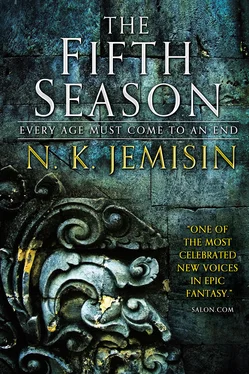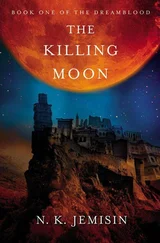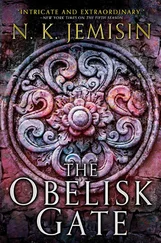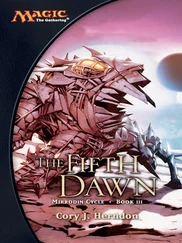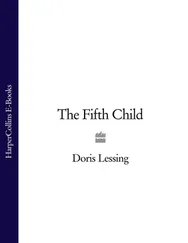(You fetched him a blanket during one of these trips. Covered him up to his ruined chin. Habit. The steampipes have stopped rattling; it’s cold in the house. He could catch something.)
Late the next day, someone knocks at the house’s front door. You do not stir yourself to answer it. That would require you to wonder who is there and whether you should let them in. Thinking of these things would make you consider your son’s corpse under the blanket, and why would you want to do that? You ignore the door knock.
Someone bangs at the window in the front room. Persistent. You ignore this, too.
Finally, someone breaks the glass on the house’s back door. You hears footsteps in the hallway between Uche’s room and that of Nassun, your daughter.
(Nassun, your daughter.)
The footsteps reach the den and stop. “Essun?”
You know this voice. Young, male. Familiar, and soothing in a familiar way. Lerna, Makenba’s boy from down the road, who went away for a few years and came back a doctor. He’s not a boy anymore, hasn’t been for a while, so you remind yourself again to start thinking of him as a man.
Oops, thinking. Carefully, you stop.
He inhales, and your skin reverberates with his horror when he draws near enough to see Uche. Remarkably, he does not cry out. Nor does he touch you, though he moves to Uche’s other side and peers at you intently. Trying to see what’s going on inside you? Nothing, nothing . He then peels back the blanket for a good look at Uche’s body. Nothing, nothing. He pulls the blanket up again, this time over your son’s face.
“He doesn’t like that,” you say. It’s your first time speaking in two days. Feels strange. “He’s afraid of the dark.”
After a moment’s silence, Lerna pulls the sheet back down to just below Uche’s eyes.
“Thank you,” you say.
Lerna nods. “Have you slept?”
“No.”
So Lerna comes around the body and takes your arm, drawing you up. He’s gentle, but his hands are firm, and he does not give up when at first you don’t move. Just exerts more pressure, inexorably, until you have to rise or fall over. He leaves you that much choice. You rise. Then with the same gentle firmness he guides you toward the front door. “You can rest at my place,” he says.
You don’t want to think, so you do not protest that you have your own perfectly good bed, thank you. Nor do you declare that you’re fine and don’t need his help, which isn’t true. He walks you outside and down the block, keeping a grip on your elbow the whole time. A few others are gathered on the street outside. Some of them come near the two of you, saying things to which Lerna replies; you don’t really hear any of it. Their voices are blurring noise that your mind doesn’t bother to interpret. Lerna speaks to them in your stead, for which you would be grateful if you could bring yourself to care.
He gets you to his house, which smells of herbs and chemicals and books, and he tucks you into a long bed that has a fat gray cat on it. The cat moves out of the way enough to allow you to lie down, then tucks itself against your side once you’re still. You would take comfort from this if the warmth and weight did not remind you a little of Uche, when he naps with you.
Napped with you. No, changing tense requires thought. Naps .
“Sleep,” Lerna says, and it is easy to comply.
* * *
You sleep a long time. At one point you wake. Lerna has put food on a tray beside the bed: clear broth and sliced fruit and a cup of tea, all long gone to room temperature. You eat and drink, then go into the bathroom. The toilet does not flush. There’s a bucket beside it, full of water, which Lerna must have put there for this purpose. You puzzle over this, then feel the imminence of thought and have to fight, fight, fight to stay in the soft warm silence of thoughtlessness. You pour some water down the toilet, put the lid back down, and go back to bed.
* * *
In the dream, you’re in the room while Jija does it. He and Uche are as you saw them last: Jija laughing, holding Uche on one knee and playing “earthshake” while the boy giggles and clamps down with his thighs and waggles his arms for balance. Then Jija suddenly stops laughing, stands up — throwing Uche to the floor — and begins kicking him. You know this is not how it happened. You’ve seen the imprint of Jija’s fist, a bruise with four parallel marks, on Uche’s belly and face. In the dream Jija kicks, because dreams are not logical.
Uche keeps laughing and waggling his arms, like it’s still a game, even as blood covers his face.
You wake screaming, which subsides into sobs that you cannot stop. Lerna comes in, tries to say something, tries to hold you, and finally makes you drink a strong, foul-tasting tea. You sleep again.
* * *
“Something happened up north,” Lerna tells you.
You sit on the edge of the bed. He’s in a chair across from you. You’re drinking more nasty tea; your head hurts worse than a hangover. It’s nighttime, but the room is dim. Lerna has lit only half the lanterns. For the first time you notice the strange smell in the air, not quite disguised by the lanternsmoke: sulfur, sharp and acrid. The smell has been there all day, growing gradually worse. It’s strongest when Lerna’s been outside.
“The road outside town has been clogged for two days with people coming from that direction.” Lerna sighs and rubs his face. He’s fifteen years younger than you, but he no longer looks it. He has natural gray hair like many Cebaki, but it’s the new lines in his face that make him seem older — those, and the new shadows in his eyes. “There’s been some kind of shake. A big one, a couple of days ago. We felt nothing here, but in Sume—” Sume is in the next valley over, a day’s ride on horseback. “The whole town is…” He shakes his head.
You nod, but you know all this without being told, or at least you can guess. Two days ago, as you sat in your den staring at the ruin of your child, something came toward the town: a convulsion of the earth so powerful you have never sessed its like. The word shake is inadequate. Whatever-it-was would have collapsed the house on Uche, so you put something in its way — a breakwater of sorts, composed of your focused will and a bit of kinetic energy borrowed from the thing itself. Doing this required no thought; a newborn could do it, although perhaps not so neatly. The shake split and flowed around the valley, then moved on.
Lerna licks his lips. Looks up at you, then away. He’s the other one, besides your children, who knows what you are. He’s known for a while, but this is the first time he’s been confronted by the actuality of it. You can’t really think about that, either.
“Rask isn’t letting anyone leave or come in.” Rask is Rask Innovator Tirimo, the town’s elected headman. “It’s not a full-on lockdown, he says, not yet, but I was going to head over to Sume, see if I could help. Rask said no, and then he set the damn miners on the wall to supplement the Strongbacks while we send out scouts. Told them specifically to keep me within the gates.” Lerna clenches his fists, his expression bitter. “There are people out there on the Imperial Road. A lot of them are sick, injured, and that rusty bastard won’t let me help .”
“First guard the gates,” you whisper. It is a rasp. You screamed a lot after that dream of Jija.
“What?”
You sip more tea to soothe the soreness. “Stonelore.”
Lerna stares at you. He knows the same passages; all children learn them, in creche. Everyone grows up on campfire tales of wise lorists and clever geomests warning skeptics when the signs begin to show, not being heeded, and saving people when the lore proves true.
Читать дальше
